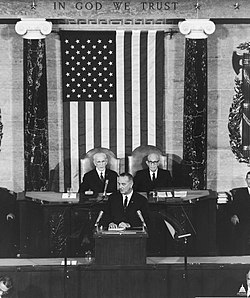Johnson Doctrine

| ||
|---|---|---|
Senator from Texas
37th Vice President of the United States
36th President of the United States
First term
Second term
Presidential and Vice presidential campaigns
Post-presidency
|
||
The Johnson Doctrine, enunciated by U.S. President Lyndon B. Johnson after the United States' intervention in the Dominican Republic in 1965,[1] declared that domestic revolution in the Western Hemisphere would no longer be a local matter when the object is the establishment of a "Communist dictatorship".[2] It is an extension of the Eisenhower and Kennedy doctrines.
Background[]
The U.S. government disliked communist influence in the Western Hemisphere during the Cold War. In the 1960s, the Dominican Republic was a country of interest. Due to the ongoing political turmoil in the county, Dominican generals revolted in April 1965. Fearful that the members of the revolt had socialist sympathies, the US invaded the country on April 28 to reestablish a government sympathetic to them.[3]
The Doctrine[]
The Johnson Doctrine reinforced the United States government's existing doctrines against socialist expansion. In his May 2 address, Johnson specifically states that the American countries, will not permit the establishment of another "Communist government" in the Western Hemisphere.[2] The Johnson Doctrine builds off of the Kennedy and Eisenhower doctrines in that it opposes communism in the Western Hemisphere. It also parallels the Monroe Doctrine, with an emphasis on denouncing non-US (in this case socialist) interference in the Americas.
See also[]
- Doctrine
- Monroe Doctrine
- Brezhnev Doctrine
References[]
- ^ * Peters,Gerhard; Woolley, John T. "Lyndon B. Johnson: "Statement by the President Upon Ordering Troops Into the Dominican Republic.," April 28, 1965". The American Presidency Project. University of California - Santa Barbara.
- ^ a b Peters,Gerhard; Woolley, John T. "Lyndon B. Johnson: "Radio and Television Report to the American People on the Situation in the Dominican Republic.," May 2, 1965". The American Presidency Project. University of California - Santa Barbara.
- ^ "The United States Invasion of the Dominican Republic, 1961–1966 - Latin American Studies - Oxford Bibliographies - obo". Retrieved 2017-03-28.
Further reading[]
- Meiertöns, Heiko (2010): The Doctrines of US Security Policy - An Evaluation under International Law, Cambridge University Press, ISBN 978-0-521-76648-7.
- Peters,Gerhard; Woolley, John T. "Lyndon B. Johnson: "Statement by the President on the Situation in the Dominican Republic.," April 30, 1965". The American Presidency Project. University of California - Santa Barbara.
- Peters,Gerhard; Woolley, John T. "Lyndon B. Johnson: "Statement by the President on the OAS Mission to the Dominican Republic.," May 1, 1965". The American Presidency Project. University of California - Santa Barbara.
- Peters,Gerhard; Woolley, John T. "Lyndon B. Johnson: "Statement by the President on the Agreement To Form a New Government in the Dominican Republic.," September 1, 1965". The American Presidency Project. University of California - Santa Barbara.
- Foreign policy doctrines of the United States
- Presidency of Lyndon B. Johnson
- 1965 in the United States
- 1965 in international relations
- Dominican Republic–United States relations
- United States politics stubs



